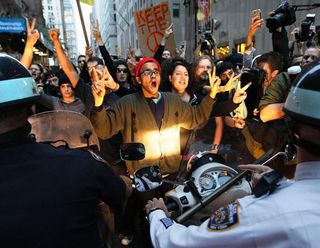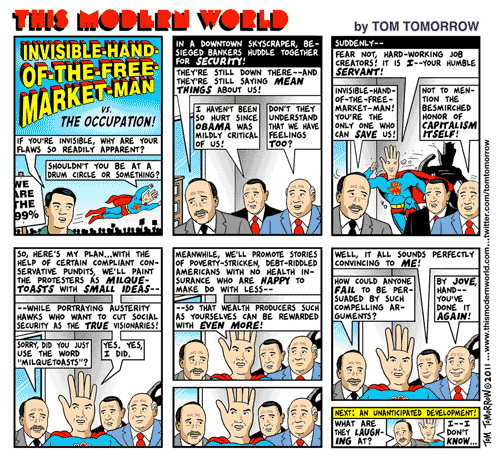I have to admit — when I first heard of the Occupy Wall Street protests, I thought it was a two or three day story.
But just the opposite has happened — the story grew and the protests grew.
Although some in the media (Fox, I'm looking at you) still feign ignorance about what the movement is about, everyone else has moved on past that by now. The message, quite simply, is about the grotesque economic inequities that have slowly crept in over the past twenty to thirty years. Starting in the 1980's, we have seen huge deregulation of the financial sector, and while Wall Street apologists are quick to point out the huge economic gains this country has made in that time, they are tone deaf to the actual complaints: the beneficiaries of those gains are at the top echelon of the economic scale. The middle and lower classes not only failed to benefit from the country's financial growth; they are actually worse off.
And so Occupy Wall Street has expanded such that it now plays a role in even smaller metropolises. Both the daily newspapers in Greensboro and Winston-Salem could not avoid covering, and had front page stories about, the Occupy Greensboro and Occupy Winston-Salem movements respectively.
I happened to come across the Occupy Greensboro encampment yesterday, located next to the Greensboro Cultural Center, and was a bit disappointed at the way it looked. There were about 15 tents and 40 people there, mostly college age and tattooed and body-pierced, with the exception of a couple of tie-dyed wearing-hippies from the 60's. They were sitting in groups of six or seven, having conversations about the movement and what to do next. And there was — oh, God — a drum circle. How much more of a cliche could this setting be?
Later that day, I spoke to an Occupy Greensboro organizer and friend, Devon Currie. She sheepishly admitted to me that OG actually paid for a permit to occupy the space. She was against it; it didn't seem in keeping with the whole "occupy" thing. But she also understood the reasoning — Occupy Greensboro hoped to be broad-based and attract more segments of the community, and it wouldn't serve that goal if everyone was swept up and arrested for trespassing on Day One. (Besides, she added, who knows what we will do when the permit runs out?) Fair enough, I thought.
And she pointed out to me that even though Occupy Greensboro appears to look like a typical protest of hippies and hippie-wannabes, the support the group is getting actually is broad-based. They have received donations (money, food, etc.) from all segments of society (small business owners, etc.). And in telling me this, she reminded me of something that I clearly and temporarily overlooked — the "Occupy" movement is so much more than those who actually place their bodies at the protests sites.
So it is important not to allow ones perception of the protesters themselves cloud ones perception of the greater cause. Surveys show that 65% of all Americans stand behind the Occupy Wall Street movement, and that number probably goes up when you take into account the global response (Occupy Rome, etc). It's just that most of us — myself included — simply can't be a part of the actual occupations. So let the hippies and hippie wannabes have their conversation "raps" and drum circles — they have (apparently) the time and inclination (and to be fair, college age students are the hardest hit by this economic crisis).
(That said — there ARE interesting ways, besides donating, that you can voice your protest)
But the movement and its supporters are much, much broader. As this weekend's must-read New York Times editorial states (in supporting the protests):
The protests, though, are more than a youth uprising. The protesters’ own problems are only one illustration of the ways in which the economy is not working for most Americans. They are exactly right when they say that the financial sector, with regulators and elected officials in collusion, inflated and profited from a credit bubble that burst, costing millions of Americans their jobs, incomes, savings and home equity. As the bad times have endured, Americans have also lost their belief in redress and recovery.
Sure, there are nay-sayers. Some Tea Party spokespersons, for example. like to draw a distinction between their protests ("Oh, we would never break any laws") and the OWS protests. Of course, as Jon Stewart pointed out, the Tea Party movement is named after one of the most historically praised criminal ventures, where patriots actually committed felonies by breaking into merchant vessels and tossing the contents overboard. By contrast, the trespassing misdemeanors of the OWS protesters is comparatively tame.
The movement is already a success. It has occupied the headlines of every major news outlet AND local news outlet. It's put the issue of economic disparity at the forefront.
And it has got the attention of the lords of finance, some of whom privately "dismiss the protesters as gullible and unsophisticated". Unfortunately, the large Wall Street bankers can't say this publicly, for fear of further lending support to the OWS movement.
True, some smaller financial institutions recognize that there truly is a problem, i.e., that Wall Street has severely screwed over Main Street, and that something needs to be done.
But even if we have a lot of people saying "Okay. We get the problem", what comes next? However,
It is not the job of the protesters to draft legislation. That’s the job of the nation’s leaders, and if they had been doing it all along there might not be a need for these marches and rallies. Because they have not, the public airing of grievances is a legitimate and important end in itself. It is also the first line of defense against a return to the Wall Street ways that plunged the nation into an economic crisis from which it has yet to emerge.
And as long as they keep that pressure on, which they will be able to do with the support of the broader community, we just might get our nation's leaders to finally address and tackle this problem. Along this line, I leave the last word to Paul Krugman:
And there are real political opportunities here. Not, of course, for today’s Republicans, who instinctively side with those Theodore Roosevelt-dubbed “malefactors of great wealth.” Mitt Romney, for example — who, by the way, probably pays less of his income in taxes than many middle-class Americans — was quick to condemn the protests as “class warfare.”
But Democrats are being given what amounts to a second chance. The Obama administration squandered a lot of potential good will early on by adopting banker-friendly policies that failed to deliver economic recovery even as bankers repaid the favor by turning on the president. Now, however, Mr. Obama’s party has a chance for a do-over. All it has to do is take these protests as seriously as they deserve to be taken.
And if the protests goad some politicians into doing what they should have been doing all along, Occupy Wall Street will have been a smashing success.
And today, sadly, we see a rather meager start.


